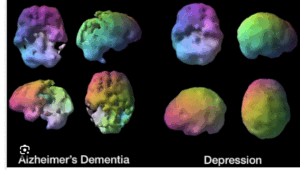
Although the majority of those affected by Alzheimer’s disease are over 65, it’s never too early to recognise the symptoms of this prevalent brain illness.
Additionally, you might be able to identify them years before things start to go south.
Dr. Daniel Amen, a double board-certified psychiatrist and brain imaging researcher in California, recently posted on social media that “Alzheimer’s disease actually starts in the brain decades before you have any symptoms.
Four warning signs that may indicate you are in the early stages of Alzheimer’s disease are being revealed by psychiatrist and brain imaging expert Dr. Daniel Amen.
Alzheimer’s disease, which slowly impairs memory, cognitive abilities, and the capacity to carry out basic tasks, affects an estimated 6.7 million Americans.
Alzheimer’s disease, which slowly impairs memory, cognitive abilities, and the capacity to carry out basic tasks, affects an estimated 6.7 million Americans.
Amen is outlining four warning signs that could indicate a brain problem, along with a number of risk factors that need to be addressed right away.
Memory problems

According to Amen, the first red flag is a decline in memory compared to ten years ago.
People with dementia find it difficult to remember recent events, discussions, or important details, even though periodic forgetfulness is a natural part of ageing.
One of the first parts of the brain to be impacted by Alzheimer’s is the hippocampus, which is in charge of creating new memories.
Impulsivity and poor judgement
Damage to the frontal lobes, which are important regions for reasoning and decision-making, might make it harder to comprehend dangers, deal with day-to-day issues, and handle money.
According to Amen, it’s “like your [brain] is going offline.”
little capacity for focus
It can be difficult for people with Alzheimer’s to focus or pay attention for long enough to finish simple chores.
“Distractibility — not like ADHD that you’ve had your entire life — seems to be accelerating,” according to Amen, is when this happens.
Depressed

Up to half of Alzheimer’s patients experience depressed symptoms, according to research, which is significantly higher than the overall population.
Because the disease affects the parts of the brain that regulate emotions, patients often have less control over their emotions and commonly suffer emotional changes like irritation or significant mood swings.
Change or circumstances that push them beyond their comfort zone may cause them to become confused or anxious.






